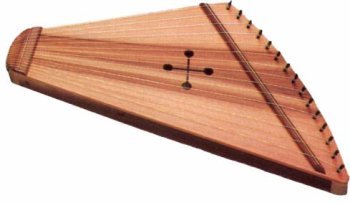Language Home
German English
Invented
English Words
Finnish
English
Swahili
English
Short Story
Search
Sources
Language
Links
Books:
-Language Books
-Foreign Language Books
-Dictionaries
A B C D E F G H I J K L M N
O P Q R S T U V W X Y Z

A B C D E F G H I J K L M N
O P Q R S T U V W X Y Z
|
Please do not plagiarize. If you would
like to use this information in a print or electronic publication,
please ask me for
permission first and cite this page as:
Knapp, Robbin D.
2008. "Finnish
English: K". In Robb:
Finnish English. Jun. 17, 2008.
You can order most of the cited books and other media through Amazon simply by clicking on the titles.

 kantele n. kantele n.- from kantele: a traditional Finnish zither or harp
originally with five to 15 strings but now with as many as 39, also
called a kannel. This entry suggested by Heikki Petaisto.
 "Bring the
instrument to me and carry the kantele to two upright kneecaps, to
the tips of ten fingernails!" Elias Lönnrot, The Kalevala, 1999, p. 535. "Bring the
instrument to me and carry the kantele to two upright kneecaps, to
the tips of ten fingernails!" Elias Lönnrot, The Kalevala, 1999, p. 535.- "Epic songs indicate the importance of the kantele
in the ancient tietäjä's art and Siikala suggests
that the kantele may thus represent a musical descendant of
an earlier Balto-Finnish tradition." Thomas A. DuBois, Nordic Religions in the Viking Age,
1999, p. 131.
- "Certain instruments were considered appropriate for
women, however, particularly the kantele (the Finnish
national instrument, a type of zither) and mandolin." Helmi
Järviluoma, in Music and Gender, edited by Pirkko
Moisala & Beverley Diamond, 2000, p. 56.
- "... housewives get out family recipes from the old
country; musicians dust off their kanteles (Finnish
stringed instruments similar to dulcimers)." Ruth Kirk & Carmela Alexander, Exploring
Washington's Past: A Road Guide to History, 1995, p. 423.
- "Skapti had the kantele out and had tuned it
carefully, adjusting the harpstrings and checking the birchwood
frame for damage." Catherine Fisher, Snow-walker, 2004, p. 419.
- More books and products related to kantele
 Kalevala, Kalevala n. Kalevala, Kalevala n.- from Kalevala: in Finnish legend, the home or land
of the folk hero Kaleva, whose exploits are recorded in Finnish folk
tales, therefore another name for Finland; italicized, the national
epic of Finland (1835, enlarged 1849), compiled and arranged by Elias
Lönnrot from popular tales of the Middle Ages [< Finnish Kalevala
"the land of Kaleva"].
|







![]()